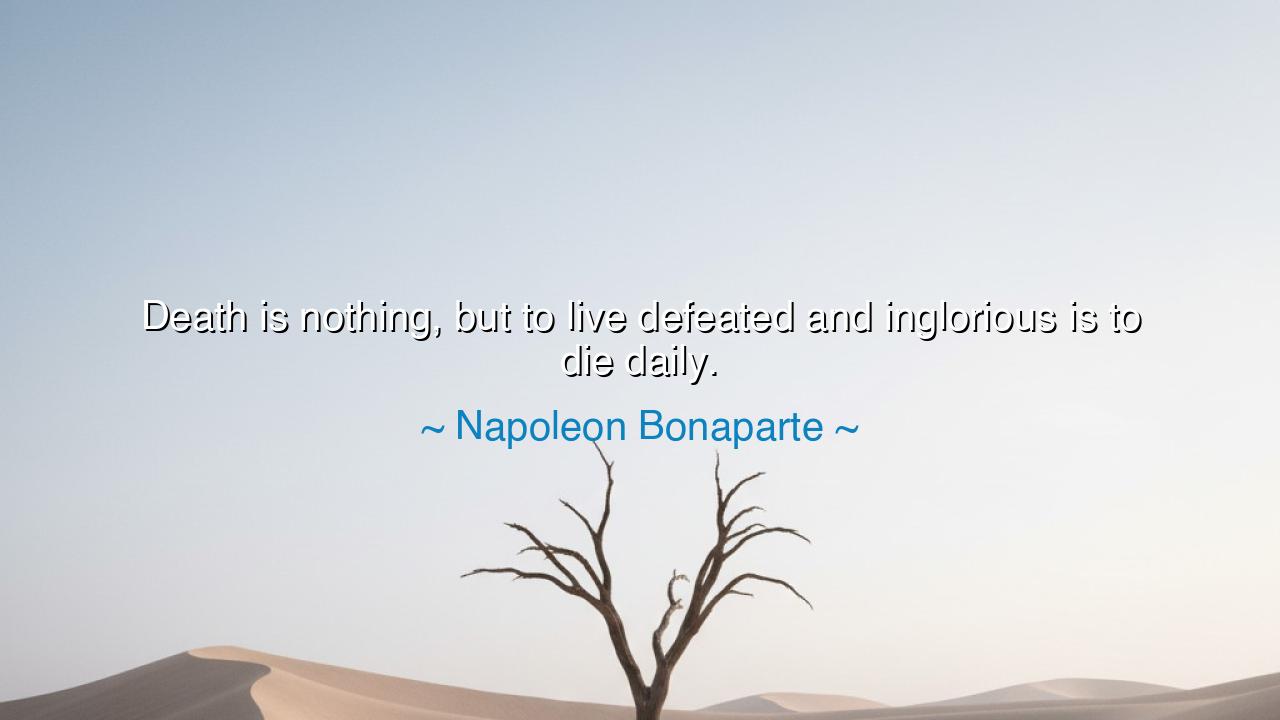
Death is nothing, but to live defeated and inglorious is to die






“Death is nothing, but to live defeated and inglorious is to die daily.” Thus spoke Napoleon Bonaparte, the soldier of destiny, the man who rose from obscurity to shake the thrones of Europe. In these words, he revealed the creed of the warrior and the spirit of the unconquerable soul. To him, death—that shadow feared by kings and peasants alike—was no enemy. The true enemy, he declared, was defeat without honor, the slow corrosion of the spirit that comes when one abandons courage, purpose, or pride. To die once, he said, is nothing; but to live in submission to fear, to compromise one’s ideals, to surrender one’s greatness—that is to die every day.
Napoleon was a man who lived as though eternity burned behind him. From the snows of Russia to the sands of Egypt, he faced the extremes of triumph and ruin. Yet even in exile, when his empire had crumbled and his name was cursed by nations, he carried within him the flame of defiance. This quote was not born of arrogance, but of understanding—a recognition that the worth of life lies not in its length, but in its dignity. Death, to him, was a single moment; defeat, if accepted inwardly, was a perpetual one. A man stripped of hope and courage becomes a living ghost, his heart beating, yet devoid of fire.
The ancients, too, spoke of this truth. The Stoic philosophers taught that death is not to be feared, for it is simply nature’s law; what matters is how a man lives before he meets it. Socrates went calmly to his death, saying that no harm can come to a good man, whether in life or after it. For the Stoics, as for Napoleon, honor and integrity were the measure of existence. To live without them was to fall below the dignity of man—to exist in body, but not in soul. Napoleon’s words, therefore, belong to this lineage of timeless wisdom: they exalt the inner victory of the spirit over the outward defeat of circumstance.
Consider the story of Leonidas of Sparta, who with three hundred men stood against the might of the Persian Empire at Thermopylae. They knew death was certain, yet they chose to fight, not for victory, but for glory and freedom. When a Persian envoy told them their arrows would blot out the sun, a Spartan replied, “Then we shall fight in the shade.” They died that day, but their spirit did not perish—it became immortal, woven into the very fabric of courage. Leonidas and his warriors understood what Napoleon would later voice: that to live on one’s knees is a worse fate than to die standing tall.
Napoleon’s words also speak to the inner battles that each person must face. For not all defeats are written in the fields of war. Many die daily in quieter ways—when they surrender their dreams to fear, when they let the fire of conviction die within them, when they trade their integrity for comfort or approval. Such a life, empty of struggle and passion, is a kind of living death. To live “defeated and inglorious,” Napoleon warns, is not merely to lose a war, but to lose the very essence of what makes life worth living. The heart that no longer dares, the will that no longer strives—these are tombs within the living.
Yet, there is a paradox in his statement, and within it, a deeper truth. For Napoleon himself would come to know the bitterness of defeat—banished to Elba, and later to the lonely rock of St. Helena. But even there, surrounded by the vast indifference of the sea, his mind still roamed the battlefields of glory. Though his empire was gone, he remained unbroken in spirit. This is the essence of his quote: that one’s true defeat is not in what the world takes from you, but in what you allow it to extinguish within you. The man who keeps his pride, his vision, his will—he lives still, even when all else is lost.
The lesson, then, is this: live with honor, or not at all. Do not fear death, for it is but a single shadow. Fear instead the dulling of the soul, the slow surrender to mediocrity, the habit of compromise that robs life of meaning. Let each day be lived with purpose, with courage, with the willingness to stand for what is right even in the face of failure. Better to fall in noble struggle than to linger in timid comfort. For as Napoleon taught, death may claim the body once—but cowardice kills the spirit again and again.
So, my listener, remember this truth as you walk through the world: “Death is nothing, but to live defeated and inglorious is to die daily.” Do not measure life by its safety, but by its strength. Choose the harder path, the one that demands your full heart. Live with boldness, love with honor, and stand with courage even when the cost is great. For the one who dares to live gloriously never truly dies—and the one who lives without glory was never truly alive.






AAdministratorAdministrator
Welcome, honored guests. Please leave a comment, we will respond soon